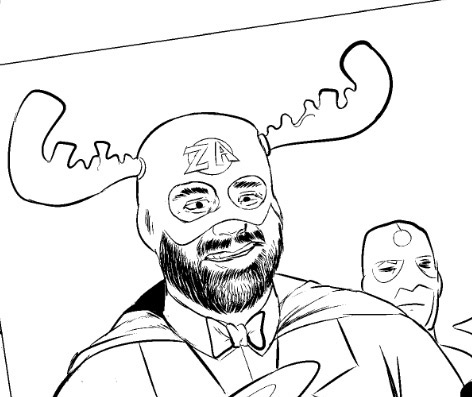Then, in the space of a single Bleat, Lileks leaped to a conclusion that I take a bit of issue with.
Also from last Wednesday’s Bleat:
Oh: I mentioned yesterday that I wrote a column on Intelligent Design. Basic point: I don’t think schools should be required to teach it. No. But science classes might profit from the occasional discussion hour where students get to speculate about these things. I’ve never thought evolution was in conflict with the idea of a Maker, but that’s just me; everyone tries to square the Mysteries of the Universe with the intellectual emotions that give them a sense of satisfaction and completeness, so if you come up with a cosmological model that feels satisfying, you should worry. That said, I can easily understand how some see God everywhere in creation, and somewhat baffled by those who see God nowhere. I admit it’s hard to square the idea of an intervening diety[sic[ with human suffering – why didn’t He stop the tsunamis? But that’s like saying that the existence of an intact anthill in Rio disproves the existence of my left foot, when it might mean I just haven’t had the chance to get on a plane to Brazil and kick the thing over. I don’t trouble myself with the micro aspect of theology, since God would seem to be a Macro kind of guy. My only point is that leaving speculative discussions out of science – if only one class, once a year – is like teaching kids about the Constitution without having an hour to discuss whether rights are granted by man or inherently endowed by a creator. Can we talk? As a great bony deep thinker once brayed.
emphasis mine
This is actually something I’ve been thinking about a lot lately, namely: just how involved in daily life is God?
Lilek’s views on a Macro vs. a Micro God seem to evoke a bit of Deism, which to me seems like a bit of an intellectual cop-out so that we don’t have to think about the nature of suffering and why God allows it.
More to the Micro/Macro debate, though, I’ve found that my thoughts on the matter are crystalized in a quote of Chesterton’s:
A child kicks its legs rhythmically through excess, not absence, of life. Because children have abounding vitality, because they are in spirit fierce and free, therefore they want things repeated and unchanged. They always say, “Do it again”; and the grown-up person does it again until he is nearly dead. For grown-up people are not strong enough to exult in monotony. But perhaps God is strong enough… It is possible that God says every morning, “Do it again,” to the sun; and every evening, “Do it again,” to the moon. It may not be automatic necessity that makes all daisies alike: it may be that God makes every daisy separately, but has never got tired of making them. It may be that He has the eternal appetite of infancy; for we have sinned and grown old, and our Father is younger than we.
What a wonderful quote! The image of God rejoicing in tasks we would call “monotonous”, the childlike joy that He takes in the “simple” act of creating life make it impossible for me not to be happy. Even as I read that quote again, I find myself smiling without even thinking about it. It is indeed a heartening notion and one that I would do well not to forget as I head to work each day.
I should be endeavoring, in every way that I can, to perform each task given to me with joy and to rejoice in the chance to do it for God.
I have no idea if Lileks will ever see this piece, but if he does, I hope it gives him pause and perhaps even heartens him a bit, for I think there’s a good deal to be said for a God that rejoices in the simple and the complex alike.




